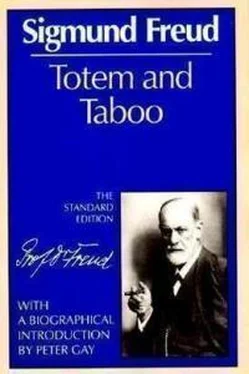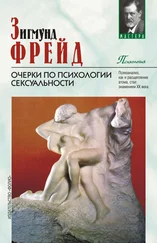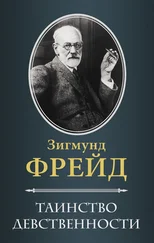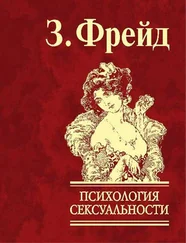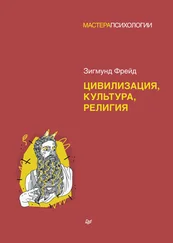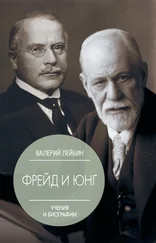Зигмунд Фрейд - Totem and Taboo
Здесь есть возможность читать онлайн «Зигмунд Фрейд - Totem and Taboo» весь текст электронной книги совершенно бесплатно (целиком полную версию без сокращений). В некоторых случаях можно слушать аудио, скачать через торрент в формате fb2 и присутствует краткое содержание. Год выпуска: 2014, Издательство: epubBooks Classics, Жанр: Психология, на английском языке. Описание произведения, (предисловие) а так же отзывы посетителей доступны на портале библиотеки ЛибКат.
- Название:Totem and Taboo
- Автор:
- Издательство:epubBooks Classics
- Жанр:
- Год:2014
- ISBN:нет данных
- Рейтинг книги:3 / 5. Голосов: 1
-
Избранное:Добавить в избранное
- Отзывы:
-
Ваша оценка:
- 60
- 1
- 2
- 3
- 4
- 5
Totem and Taboo: краткое содержание, описание и аннотация
Предлагаем к чтению аннотацию, описание, краткое содержание или предисловие (зависит от того, что написал сам автор книги «Totem and Taboo»). Если вы не нашли необходимую информацию о книге — напишите в комментариях, мы постараемся отыскать её.
Totem and Taboo — читать онлайн бесплатно полную книгу (весь текст) целиком
Ниже представлен текст книги, разбитый по страницам. Система сохранения места последней прочитанной страницы, позволяет с удобством читать онлайн бесплатно книгу «Totem and Taboo», без необходимости каждый раз заново искать на чём Вы остановились. Поставьте закладку, и сможете в любой момент перейти на страницу, на которой закончили чтение.
Интервал:
Закладка:
The Darwinian conception of the primal horde does not, of course, allow for the beginning of totemism. There is only a violent, jealous father who keeps all the females for himself and drives away the growing sons. This primal state of society has nowhere been observed. The most primitive organization we know, which to–day is still in force with certain tribes, is associations of men consisting of members with equal rights, subject to the restrictions of the totemic system, and founded on matriarchy, or descent through the mother [209] For a recent contribution compare The Whole House of the Chilkat , by G. T. Emmons ( American Museum Journal , Vol. XVI, No. 7.) [Translator].
. Can the one have resulted from the other, and how was this possible?
By basing our argument upon the celebration of the totem we are in a position to give an answer: One day [210] The reader will avoid the erroneous impression which this exposition may call forth by taking into consideration the concluding sentence of the subsequent chapter.
the expelled brothers joined forces, slew and ate the father, and thus put an end to the father horde. Together they dared and accomplished what would have remained impossible for them singly. Perhaps some advance in culture, like the use of a new weapon, had given them the feeling of superiority. Of course these cannibalistic savages ate their victim. This violent primal father had surely been the envied and feared model for each of the brothers. Now they accomplished their identification with him by devouring him and each acquired a part of his strength. The totem feast, which is perhaps mankind’s first celebration, would be the repetition and commemoration of this memorable, criminal act with which so many things began, social organization, moral restrictions and religion [211] The seemingly monstrous assumption that the tyrannical father was overcome and slain by a combination of the expelled sons has also been accepted by Atkinson as a direct result of the conditions of the Darwinian primal horde. “A youthful band of brothers living together in forced celibacy, or at most in polyandrous relation with some single female captive. A horde as yet weak in their impubescence they are, but they would, when strength was gained with time, inevitably wrench by combined attacks, renewed again and again, both wife and life from the paternal tyrant” ( Primal Law , pp. 220–1). Atkinson, who spent his life in New Caledonia and had unusual opportunities to study the natives, also refers to the fact that the conditions of the primal horde which Darwin assumes can easily be observed among herds of wild cattle and horses and regularly lead to the killing of the father animal. He then assumes further that a disintegration of the horde took place after the removal of the father through embittered fighting among the victorious sons, which thus precluded the origin of a new organization of society; “An ever recurring violent succession to the solitary paternal tyrant by sons, whose parricidal hands were so soon again clenched in fratricidal strife” (p. 228). Atkinson, who did not have the suggestions of psychoanalysis at his command and did not know the studies of Robertson Smith, finds a less violent transition from the primal horde to the next social stage in which many men live together in peaceful accord. He attributes it to maternal love that at first only the youngest sons and later others too remain in the horde, who in return for this toleration acknowledge the sexual prerogative of the father by the restraint which they practise towards the mother and towards their sisters.
.
In order to find these results acceptable, quite aside from our supposition, we need only assume that the group of brothers banded together were dominated by the same contradictory feelings towards the father which we can demonstrate as the content of ambivalence of the father complex in all our children and in neurotics. They hated the father who stood so powerfully in the way of their sexual demands and their desire for power, but they also loved and admired him. After they had satisfied their hate by his removal and had carried out their wish for identification with him, the suppressed tender impulses had to assert themselves [212] This new emotional attitude must also have been responsible for the fact that the deed could not bring full satisfaction to any of the perpetrators. In a certain sense it had been in vain. For none of the sons could carry out his original wish of taking the place of the father. But failure is, as we know, much more favourable to moral reaction than success.
. This took place in the form of remorse, a sense of guilt was formed which coincided here with the remorse generally felt. The dead now became stronger than the living had been, even as we observe it to–day in the destinies of men. What the fathers’ presence had formerly prevented they themselves now prohibited in the psychic situation of ‘subsequent obedience’, which we know so well from psychoanalysis. They undid their deed by declaring that the killing of the father substitute, the totem, was not allowed, and renounced the fruits of their deed by denying themselves the liberated women. Thus they created the two fundamental taboos of totemism out of the sense of guilt of the son , and for this very reason these had to correspond with the two repressed wishes of the Oedipus complex. Whoever disobeyed became guilty of the two only crimes which troubled primitive society [213] “Murder and incest, or offences of like kind against the sacred law of blood are in primitive society the only crimes of which the community as such takes cognizance … ” Religion of the Semites , p. 419.
.
The two taboos of totemism with which the morality of man begins are psychologically not of equal value. One of them, the sparing of the totem animal, rests entirely upon emotional motives; the father had been removed and nothing in reality could make up for this. But the other, the incest prohibition, had, besides, a strong practical foundation. Sexual need does not unite men; it separates them. Though the brothers had joined forces in order to overcome the father, each was the other’s rival among the women. Each one wanted to have them all to himself like the father, and in the fight of each against the other the new organization would have perished. For there was no longer any one stronger than all the rest who could have successfully assumed the rôle of the father. Thus there was nothing left for the brothers, if they wanted to live together, but to erect the incest prohibition—perhaps after many difficult experiences—through which they all equally renounced the women whom they desired, and on account of whom they had removed the father in the first place. Thus they saved the organization which had made them strong and which could be based upon the homo–sexual feelings and activities which probably manifested themselves among them during the time of their banishment. Perhaps this situation also formed the germ of the institution of the mother right discovered by Bachofen, which was then abrogated by the patriarchal family arrangement.
On the other hand the claim of totemism to be considered the first attempt at a religion is connected with the other taboo which protects the life of the totem animal. The feelings of the sons found a natural and appropriate substitute for the father in the animal, but their compulsory treatment of it expressed more than the need of showing remorse. The surrogate for the father was perhaps used in the attempt to assuage the burning sense of guilt, and to bring about a kind of reconciliation with the father. The totemic system was a kind of agreement with the father in which the latter granted everything that the child’s phantasy could expect from him, protection, care, and forbearance, in return for which the pledge was given to honour his life, that is to say, not to repeat the act against the totem through which the real father had perished. Totemism also contained an attempt at justification, “If the father had treated us like the totem we should never have been tempted to kill him.” Thus totemism helped to gloss over the real state of affairs and to make one forget the event to which it owed its origin.
Читать дальшеИнтервал:
Закладка:
Похожие книги на «Totem and Taboo»
Представляем Вашему вниманию похожие книги на «Totem and Taboo» списком для выбора. Мы отобрали схожую по названию и смыслу литературу в надежде предоставить читателям больше вариантов отыскать новые, интересные, ещё непрочитанные произведения.
Обсуждение, отзывы о книге «Totem and Taboo» и просто собственные мнения читателей. Оставьте ваши комментарии, напишите, что Вы думаете о произведении, его смысле или главных героях. Укажите что конкретно понравилось, а что нет, и почему Вы так считаете.
